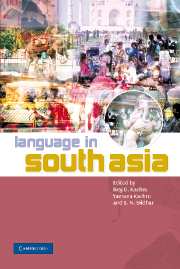Book contents
- Frontmatter
- Contents
- List of Figures
- List of Maps
- List of Tables
- Preface
- Acknowledgments
- List of Abbreviations
- Note on Transcription
- Introduction: languages, contexts, and constructs
- Part 1 Language history, families, and typology
- Part 2 Languages and their functions
- Part 3 Sanskrit and traditions of language study
- Part 4 Multilingualism, contact, and convergence
- Part 5 Orality, literacy, and writing systems
- Part 6 Language conflicts
- Part 7 Language and modernization
- Part 8 Language and discourse
- Part 9 Language and identity
- 22 Language and gender
- 23 Dalit literature, language, and identity
- 24 Language and youth culture
- Part 10 Languages in diaspora
- References
- Subject Index
- Language Index
- Author Index
22 - Language and gender
Published online by Cambridge University Press: 04 May 2010
- Frontmatter
- Contents
- List of Figures
- List of Maps
- List of Tables
- Preface
- Acknowledgments
- List of Abbreviations
- Note on Transcription
- Introduction: languages, contexts, and constructs
- Part 1 Language history, families, and typology
- Part 2 Languages and their functions
- Part 3 Sanskrit and traditions of language study
- Part 4 Multilingualism, contact, and convergence
- Part 5 Orality, literacy, and writing systems
- Part 6 Language conflicts
- Part 7 Language and modernization
- Part 8 Language and discourse
- Part 9 Language and identity
- 22 Language and gender
- 23 Dalit literature, language, and identity
- 24 Language and youth culture
- Part 10 Languages in diaspora
- References
- Subject Index
- Language Index
- Author Index
Summary
Introduction
Over the past thirty to forty years, issues related to the study of language and gender have been examined, described, interpreted, explained, revised, and revisited by linguists, sociologists, psychologists, educators, feminist scholars, and others primarily within the contexts of the middle-class, white, monolingual, heterosexual, Western societies and cultures, generalizing the findings to all populations of the world. A major criticism of the work done in this area has been that language and gender scholarship has taken positions that are fundamentally ideological and political, forcing scholars to take a stand on one side of an issue or the other. When tracing the history of writings on language and gender from early anthropological accounts that touched on sex differences in non-European languages to the frequently cited scholarly works and popular readings influencing the prominent models used to study language and gender today, we see that this perspective certainly holds true. As a result, criticized for being motivated by feminist politics and personal interests, gender studies has been marginalized as an “unscientific” academic discipline by mainstream linguists and shunned by women and men of Asia, Africa, Latin America and other regions of the developing world (Kishwar 2000; Schirmer 1989).
A further challenge to scholars of language and gender research is the essentialist principle of “gender is difference,” a persistent theme that runs through early language studies. Within the essential feminity of women and masculinity of men, early researchers assumed that the language differences found between women and men reflect underlying biological differences.
- Type
- Chapter
- Information
- Language in South Asia , pp. 429 - 449Publisher: Cambridge University PressPrint publication year: 2008
- 4
- Cited by



